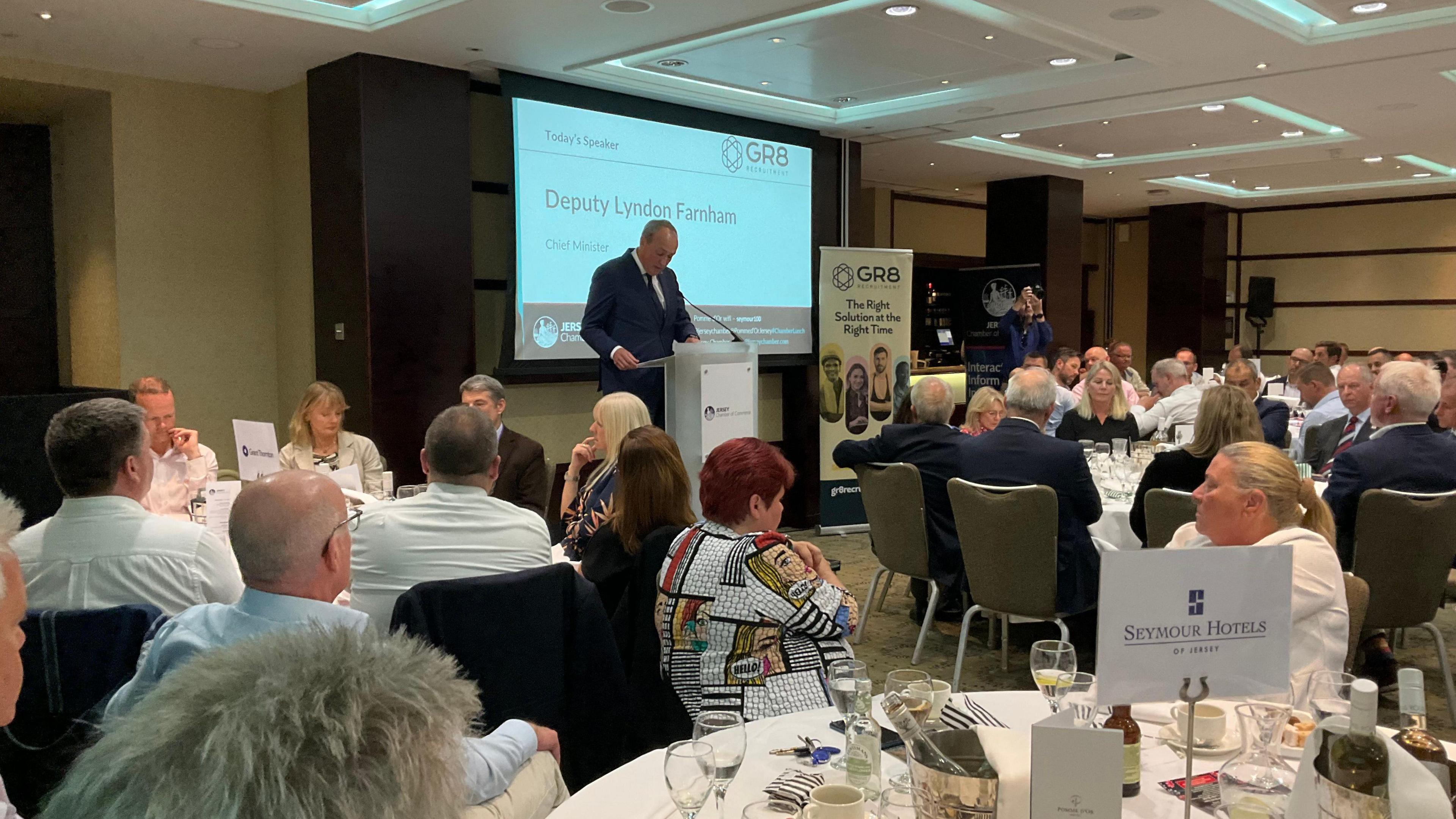Minimum wage rise key priority for chief minister

Priorities also included providing all States primary schools with free lunches and reducing GP fees
- Published
Raising the minimum wage by 2026 is a key priority, the chief minister has said.
Deputy Lyndon Farnham outlined his top priorities for the final two years of government at a lunch for businesses at a hotel in St Helier on Wednesday.
Helping islanders with the cost of living, providing all States primary schools with free lunches and reducing GP fees were also promised.
Mr Farnham said raising the minumum wage to two-thirds of median earnings would help those "who are struggling the most" in the community - with up to £20m in support to be made available "if necessary".
He said: "Rather than a direct subsidy this will be in the form of support schemes to promote productivity and skills development, with targeted support across sectors, including for retail, agriculture, and the visitor economy."
'Support public services'
Mr Farnham said work had started to address 38 recommendations made by Jersey Business in its Barriers to Business report, external.
The report included issues with communicating with the government and not having enough staff with relevant skills.
Mr Farnham also said it was working on the delivery of skills development including promoting apprenticeships.
"Only by improving productivity and developing a strong, diverse economy can we ensure the tax revenues necessary to support the quality public services that islanders need," he said.
The government's other priorities included:
Extending free nursery and childcare provision
Increase the provision of lifelong learning and skills development
Implementing recommendations from the Violence Against Women and Girls Taskforce report
Providing more affordable homes for islanders to buy and rent
Keeping government fees, duties, and charges as low as possible
Delivering a plan to revitalise Town
Reducing the impacts of climate change
Shelly Kendrick said some jobs need to hire staff from off-island
Mr Farnham said the government was focused on "developing our own, local, talent across the civil service and public sector".
Shelly Kendrick, who works in recruitment, said it was difficult to hire people locally in certain sectors.
She said: "We’re still facing the licences issue, we’re not working closely enough with government in those areas.
"How are we going to get these people over here, reducing obstacles and hurdles to get licences for people for businesses, when we’re supposed to be supporting our own industries.
"Our own community doesn’t have enough skills in order to fill those gaps."
Gerald Voisin said the raised minimum wage would affect the tourism sector
Mr Farnham said the £20m would be "targeted support" across sectors - including retail, agriculture and the visitor economy.
Gerald Voisin, a local retailer, said he could not see "a great deal of signs around the island that our economy is flourishing".
He said: "I have to say that I find it extraordinary you’re introducing a new minimum wage that is going to require the States to start putting £20 million back into the economy to soften the blow to certain sectors.
"You must understand yourself that the tourism sector, which is going to be particularly badly hit, must be competitive on an international basis.
"What worries me... is that this loss of competitiveness is going to have an effect over many years."
David Seymour is worried tourism would be affected by future plans
Mr Farnham said the government needed "careful planning" so a balanced workforce could provide for the economy in the future.
He said population changes also needed to not be "unmanaged or unplanned".
This included hiring more workers and "potentially as many as 4,000 additional care workers by the 2040s".
David Seymour, a hotelier, said it was a worrying thought for the tourism sector.
He said: "Tourism is still highly seasonal... how do you envisage that we’re going to reduce that seasonality and encourage hotels which currently exist to continue in business?
"Or should we as big property owners be looking to convert to nursing homes and look after the 4,000 care workers which are envisaging to come into the island?"
Follow BBC Jersey on X (formerly Twitter), external and Facebook, external. Send your story ideas to channel.islands@bbc.co.uk, external.
- Published12 June
- Published3 June
- Published24 January